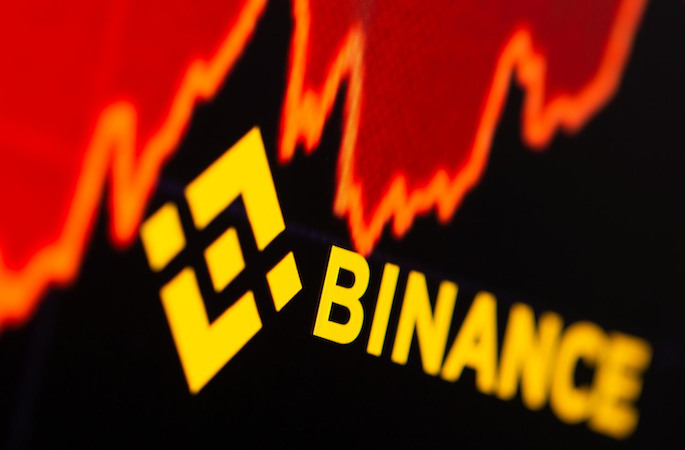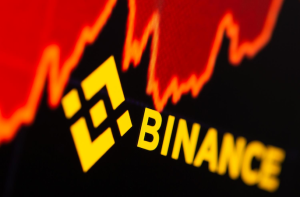Join Our Telegram channel to stay up to date on breaking news coverage
In 2017, Binance burst onto the cryptocurrency scene and developed into the largest exchange for virtual currencies in the world. It soon encountered a challenge.
A fifth of its users were in the U.S., where regulators had hinted at an impending crackdown on unlicensed offshore cryptocurrency players. It mostly operated from hubs in China and subsequently Japan. An official from Binance cautioned coworkers in a 2019 private chat that any legal action from U.S. regulators would have the effect of “nuclear fall out” on the company and its officers.
According to an investigation by The Wall Street Journal and interviews with former workers between 2018 and 2020, Binance embarked on a plan to disarm U.S. authorities out of fear of prosecution.
The plan was to create a basic American platform called Binance.US that would use Binance’s brand and technology under license but otherwise present as completely separate from Binance.com. It would protect the bigger Binance.com exchange, which wouldn’t accept users from the United States, from regulatory scrutiny.
According to the interviews, mails, and documents seen by the WSJ, Binance and Binance.US, however, have been considerably more connected than the firms have stated, mingling workers and finances and sharing an affiliated entity that purchased and sold bitcoins. The software code enabling the digital wallets used by Binance.US users was maintained by Binance developers in China, potentially allowing Binance access to U.S. consumer data.
If U.S. officials determine that these connections indicate Binance has influence over a U.S. corporation, they may assert the authority to oversee the entire operation of Binance, which has long been a mystery to many investors. Also, this would subject Changpeng Zhao, the wealthy founder and CEO of Binance, and his financial situation to more scrutiny. A Texas financial regulator recently said in a court filing that Binance.US was denied a license to conduct business in the state because its main shareholder, Mr. Zhao, refused to give financial information.
According to subpoenas and persons with knowledge of the situation, the Securities and Exchange Commission and the Justice Department have been looking into the connection between Binance, which does not disclose a headquarters, and Binance.US at least since 2020.
A group of senators from both parties addressed Binance a series of questions on Thursday, claiming that Binance has “kept basic financial information from its consumers and the public.” In several other nations, where it has been charged with operating illegally, Binance has also come under fire.
Although other cryptocurrency platforms, like FTX, collapsed last year, leaving the world of digital currencies in ruins, Binance is by far the biggest platform still in operation. The abrupt collapse of FTX forced U.S. regulators to rethink their strategy, and they are now making a concerted effort to control the $1 trillion crypto sector. The future of cryptocurrency will be tested by Binance’s ability to negotiate the current regulatory environment and interact with American regulators.
Binance’s chief strategy officer, Patrick Hillmann, stated last month that the exchange anticipates paying fines to resolve ongoing regulatory and law enforcement inquiries into its operations in the United States.
A spokesperson for Binance stated,
We accept that during those early years, we did not have sufficient compliance and controls in place. When it comes to compliance, our organization has changed significantly since then.
and also added that,
Binance.US was formed exclusively to offer U.S. clients with products and services that adhere to U.S. standards and regulations.
A Binance employee in Shanghai turned on trading for the U.S. platform a few minutes before it was scheduled to start in September 2019, putting Binance’s strong relationship with Binance.US on display. This led to an exchange in a Binance chat group on the messaging app Telegram:
According to the WSJ, major software features of Binance.US were maintained by developers in Shanghai at least through the summer of 2021. A person aware with the contracts claims that Binance, not the US platform, was the party that the Shanghai developers’ contracts were with.
The spokeswomen for Binance and Binance.US said that license agreements, including those for Binance’s technology, regulate the companies’ relationship. The spokeswoman for Binance.US said that user data for US customers is stored there and has never been combined with that of Binance.
The SEC is also looking into the connections between Binance.US and Merit Peak Ltd. and Sigma Chain AG, two trading companies connected to Mr. Zhao.
As per the authorities’ investigation, the FTX platform’s collapse was caused by an unlawful link between the exchange and an affiliated trading firm, Alameda Research, which resulted in the loss of billions of dollars in customer funds. The Binance.US spokeswoman added that in contrast to FTX,
Binance.US has never—and will never—trade nor lend out customer funds.
She specified that Merit Peak stopped operating entirely on Binance.US in 2021, while declining to comment on Sigma Chain.
Without being constrained by governmental control, Binance’s exchange had significant growth in its first two years of operation, between 2017 and 2018. Clients could access Binance.com from anywhere in the world and were exempt from the know-your-customer procedures that are typically required by banks and brokerage organizations.
Private conversations obtained by the WSJ suggest that Binance executives were concerned that the company would be subject to legal action from US regulators if they failed to take any measures to prepare for regulatory scrutiny.
According to a presentation seen by the Journal, Harry Zhou, an employee of a Binance-financed bitcoin trading business, suggested to Binance executives in late 2018 that they establish an American company that would draw the attention of U.S. enforcement and regulatory agencies while shielding Binance itself from their scrutiny.
The plan called for Binance to have a “purely contractual” relationship with the U.S. entity, which would mean that the latter would be positioned as a separate operation with its own management and staff. The section of the plan titled “Insulate Binance from US Enforcement” stated that Binance should be protected from US enforcement.
The presentation also suggested that Binance begin “massive PR efforts indicating US operation’s commitment to exceed SEC expectations and serve as an industry resource for the SEC.” This part was titled “Regulator Engagement Strategies.” Reuters and Forbes have already covered the plan’s specifics.
The presentation, according to the Binance representative, was ignored and never put into practice.
Binance.US is born
BAM Trading Services Inc., a Delaware corporation founded in February 2019 by Mr. Zhou, shortly took over operation of a firm called Binance.US. Wei Zhou, the then-chief financial officer of Binance, informed staff members in the Telegram discussion that BAM Trading Services Inc. as well as businesses dubbed BAM Management US Holdings Inc. and BAM Technology Services Inc. had been established.
Binance and BAM Trading, a business that will license Binance’s technology and brand, announced their cooperation and the launch of Binance.US in June of that year. As a money-services company, Binance.US registered with the Financial Crimes Enforcement Network of the U.S. Treasury.
According to records seen by the Journal, Binance did not disclose at the time that Mr. Zhao, the company’s founder and chief executive, owned the BAM firms through a layer of entities incorporated in the Cayman Islands and the British Virgin Islands.
Without leverage or the sophisticated derivatives that can be traded on Binance.com, just the most basic cryptocurrency trading would be available on Binance.US. Platforms that conduct derivatives trading in the US are required to register with either the SEC or the Commodities Futures Trading Commission.
Binance made the announcement that it would stop allowing Americans to use its platform. Internally, a Binance representative, however, talked about how Binance could keep American users at the bigger exchange, where they could also trade cryptocurrency derivatives, a hugely popular and lucrative industry.
An employee mentioned that more than 18% of page visits on Binance.com were from American users in the Binance chat on Telegram. Samuel Lim, who was Binance’s compliance chief at the time and referred to “nuclear fall out” from any U.S. regulatory complaint, offered suggestions on how the company could keep its major U.S. clients despite its commitment to not allowing Americans to trade on the international platform.
“Make them be creative and VPN,” he remarked in a Telegram chat in June 2019. A virtual private network, or VPN, enables a computer user to pretend to be in another nation.
In 2020, a manual on utilizing a VPN was released by Binance Academy, a division of the company that educates customers how to trade. Since then, it has been removed.
Also, Mr. Lim talked internally about whether American clients could access Binance through offshore entities. Soon after trading started, Catherine Coley, the original CEO of Binance.US, declared in a podcast that “we are a very independent organization” from Binance. “All we do is license software”.
Three months later, she instructed the team in a different Binance.US Telegram conversation to submit her success reports so she could forward them to CEO Mr. Zhao and the company’s then-CFO Wei Zhou.
Ms. Coley wrote,
Everyone please post your weeklies before tonight 7 pm est/4 pm pst so we can be in the good graces of Wei. Saturday is for the Weekly Updates! Send me 2-5 bullet points of what we think CZ/Wei should know about your work this past week.
In one instance, a staff member attempted to establish a Google Form for new Binance.US customers, but because he was logged into the global exchange, he had problems switching the author of the form from Binance.com to Binance.US.
This “will undoubtedly be picked up by the media and can be cited as direct evidence for corporate veil piercing in an adversarial judiciary procedure”, Harry Zhou commented on the Binance Telegram channel.
He said that,
It is especially troubling in this case because the form pertains to opening client accounts. If I were a prosecutor, I would point to this as proof that Binance, a unregistered foreign-based [money services organization], is in fact enrolling American clients.
Also, Harry Zhou cautioned staff members not to write in the voice of Binance when creating content for the Binance.US website. Wei Zhou, Binance’s then-CFO, replied, “Great feedback! Sit in ‘Binance.US’ shoes when drafting.”
The staff sought for approaches to contact American regulators. Gin Chao, who was then Binance’s chief strategy officer, discovered that Sigal Mandelker, a high school acquaintance, was in charge of the U.S. Treasury’s Office of Foreign Assets Control in the middle of 2019. He said this in a chat group and mentioned the possibility of running into her at the fall school reunion.
Before determining that Mr. Chao should message Ms. Mandelker on LinkedIn, Binance officials debated whether they should try to attend a conference where she was presenting.
Late January 2019, Ms. Mandelker left the Treasury. No mention of whether she ever spoke with a Binance executive was made in the conversation messages. According to a person familiar with Ms. Mandelker’s story, they didn’t.
Gary Gensler, then-chair of the Commodities Futures Trading Commission and now-chair of the SEC, was approached by Binance personnel in 2018 and 2019 to serve as an adviser. If the Democrats win the 2020 election, Mr. Gensler, who was then a professor at Massachusetts Institute of Technology, “would likely be back in a regulators seat,” a Binance employee informed coworkers in a chat.
According to the chat, Harry Zhou and Ella Zhang met with Mr. Gensler in October 2018 as the chairman of Binance’s venture investing division. “I see that Gensler was liberal in discussing license strategies, even though he denied advisor-ship,” Mr. Zhou stated in his letter.
Mr. Gensler was approached by other private companies, including Binance, to serve as an adviser, but he declined, according to a person close to him, while lecturing at MIT from 2018 to 2021. The source claimed that Mr. Gensler met the founder of Binance in March 2019 in Tokyo and conducted a video interview with him the following summer for a course on cryptocurrencies at MIT. In April 2021, Mr. Gensler was elected SEC chairman.
There are some messages on Binance. American Telegram chat indicated that Binance was in charge of at least some of their spending.
Staff members from Binance.US and Binance socialized at a retreat in a South Korean ski resort in January 2020. Then-CEO of Binance.US Ms. Coley advised her staff to consider “your shackles” before the trip, which she defined as “things of your job that demand SH replies, access, approval, or money.”
Related
- Binance Review – Fees, Features, Safety, Pros & Cons
- Upcoming Binance listings
- Binance’s Zhao Goes Head-To-Head With Kraken’s Powell
Join Our Telegram channel to stay up to date on breaking news coverage



